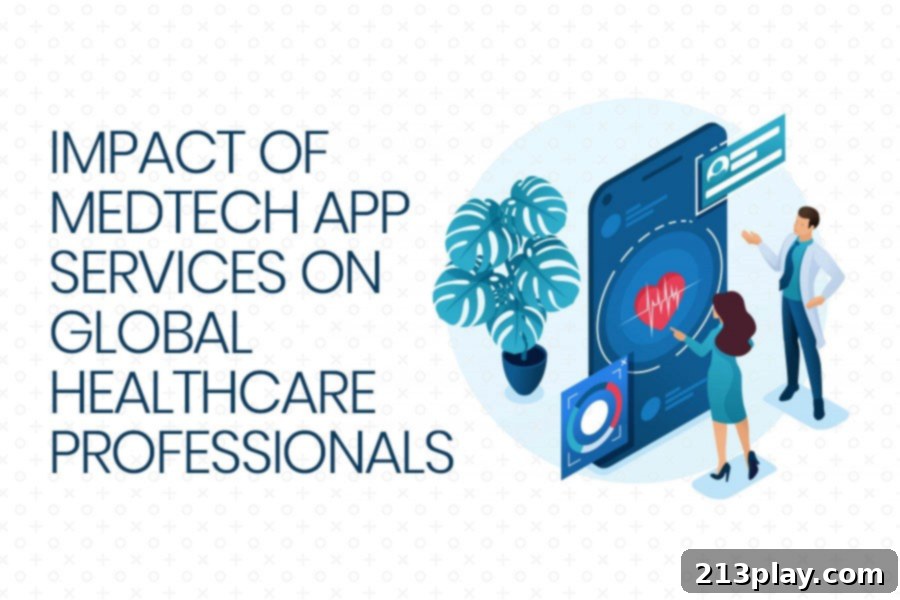The Digital Revolution in Healthcare: How Technology and Mobile Apps are Reshaping Patient Care
The healthcare landscape is undergoing an unprecedented transformation, largely driven by rapid technological advancements. What was once a field dominated by paper records and traditional practices is now embracing digitalization, connectivity, and artificial intelligence to deliver more efficient, accessible, and personalized care. This shift isn’t just about convenience; it’s fundamentally improving the quality of life for millions.
Consider this remarkable insight: an IBM study tracking trends in the healthcare industry revealed that a staggering 8 out of 10 Americans are willing to spend up to $100 on mobile app development services to monitor their vital health signs. This statistic underscores a crucial point: consumers are actively seeking technological solutions for their health management. The ubiquitous phrase, “There’s an app for that,” has never been more relevant than in the modern healthcare sector, where smartphones have become indispensable tools in both a physician’s arsenal and a patient’s daily routine.
This article delves into the profound benefits of technological advancement in healthcare, exploring its dynamic relationship with both patients and medical professionals. From streamlining administrative tasks to empowering individuals with better self-care tools, technology is rewriting the narrative of how medical assistance is provided and received.
Table of Contents
Digitalization Of Records: The Rise of EHRs
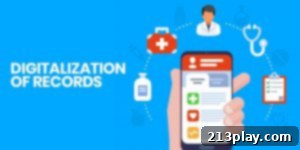
The advent of technologies like Blockchain has laid a robust foundation not only for cryptocurrencies but also for the secure digitalization of health records. Electronic Health Records (EHRs) are now a buzzing term in the healthcare sector, fundamentally transforming how patient data is managed and accessed. The transition from archaic paper records to comprehensive digital systems has been a monumental game-changer for virtually every role within the medical field, from medical assistants and coding professionals to registered nurses.
How does this work, you might wonder? Nurses and technicians meticulously input crucial patient data into a centralized, digitized system. Concurrently, medical billers and developers update patient records with diagnostic codes and submit claims to insurance providers. This integrated approach significantly reduces manual effort and the potential for human error inherent in paper-based systems. For a truly hassle-free implementation, partnering with a leading iOS and Android app development company is key, enabling seamless access to documents from any location, at any time. While digitalization introduces new complexities, it also allows for errors to be identified and rectified much more quickly, ensuring greater accuracy in patient information.
Enhancing Patient Care Through Technology
EHRs are more than just digital files; they are intelligent systems designed to improve patient safety and care quality. For instance, an EHR can be configured to automatically alert the treating physician to potential issues, such as patient allergies or intolerances to specific medications, preventing adverse reactions. The accessibility of EHRs from any medical facility is particularly beneficial for local patients, especially in critical situations where immediate access to comprehensive medical history can be life-saving. This connectivity ensures that medical professionals have a complete picture of a patient’s health, regardless of where the initial treatment occurred.
Furthermore, digital records facilitate proactive care. Physicians can monitor trends in a patient’s health over time, identify potential risks, and recommend preventive measures. This capability supports personalized treatment plans that are tailored to individual patient needs, leading to better health outcomes and a more efficient allocation of healthcare resources.
Advancing Public Health Initiatives
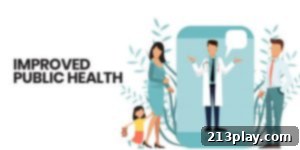
The aggregated data within digital health records provides invaluable insights for researchers, significantly accelerating medical knowledge and the advancement of treatments for widespread health issues. Imagine the challenges faced during the 2020 coronavirus outbreak; a robust, standardized healthcare IT system, leveraging the right technological blend, would have offered far quicker and deeper insights for understanding and treating the widespread disease. Such systems enable public health bodies to identify infection patterns, track disease spread, and implement preventive measures more rapidly and effectively.
Beyond crisis management, digital health data contributes to population health management by identifying health disparities, tracking chronic disease prevalence, and evaluating the effectiveness of public health interventions. This data-driven approach allows for more targeted health campaigns and better resource allocation, ultimately leading to a healthier society.
Optimizing Healthcare Workflow and Efficiency
The transformation spurred by digital health solutions also profoundly impacts healthcare professionals’ daily workflows. Allied health workers, especially medical coders and billers, have seen their roles evolve considerably. According to the Bureau of Labor Statistics, a projected 13% upsurge in related occupations from 2016 to 2026 highlights the growing demand for tech-savvy healthcare staff.
The introduction of EHRs has made life considerably easier for these professionals. Inputting data into a computerized system is far less time-consuming than traditional paper-based methods, drastically reducing errors in patient records and financial details. Moreover, the ability to access patient records remotely empowers medical coding experts and billers to work from flexible locations, enhancing productivity and efficiency. This flexibility not only boosts job satisfaction but also ensures a more resilient healthcare workforce, capable of adapting to various operational demands.
Reducing Healthcare Costs
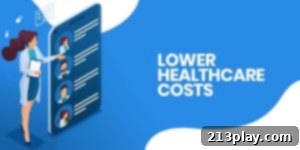
One of the most compelling advantages of digitalizing healthcare is its potential to significantly reduce costs. A study from the University of Michigan demonstrated that shifting from paper to electronic health records and treatment protocols led to a 3% reduction in outpatient costs. Researchers estimated this translates to approximately $5.14 in savings per patient each month.
These savings stem from several factors: reduced administrative overhead due to automated processes, fewer medical errors leading to costly re-treatments, optimized resource allocation, and a greater emphasis on preventive care that averts more expensive interventions down the line. Furthermore, technologies like telehealth and remote monitoring, facilitated by mobile apps, can reduce the need for frequent in-person hospital visits, further contributing to cost efficiencies for both patients and healthcare providers.
Beyond the Clinic: Benefits for Hospice Care Providers
While the benefits for doctors and clinical settings are evident, healthcare apps also offer profound advantages for hospice service providers. With comprehensive patient information readily available at their disposal, hospice and palliative care teams are better equipped to understand and deliver tailored care that meets the specific and often unique needs of their clients. This includes everything from detailed food allergies and dietary restrictions to tracking deteriorating medical conditions that require specialized attention.
Every piece of information, no matter how small, plays a vital role in providing optimum end-of-life care. Partnering with the right Android or iPhone app development services allows hospice providers to maintain seamless communication with doctors and patients’ families, enabling immediate attention when needs arise. This ensures that care is both compassionate and precisely aligned with the patient’s wishes and medical requirements, enhancing comfort and dignity during a critical time. Technology, in this context, is not just about efficiency, but about delivering a more humane and personalized care experience.
Trend 1: Artificial Intelligence in Mobile Health Apps
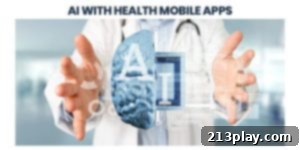
The future of mobile health apps is inextricably linked with the deployment of Artificial Intelligence (AI) technology. AI is already revolutionizing clinical workflows by providing healthcare professionals with advanced decision-support tools. Imagine a scenario where a healthcare professional accesses an AI-enabled mobile app to review a patient’s EHR, cross-reference symptoms with vast medical databases, or even receive AI-generated diagnostic suggestions. Such integration streamlines processes, enhances diagnostic accuracy, and ultimately improves patient outcomes.
AI’s capabilities extend to personalized treatment recommendations, drug discovery, and predictive analytics for disease outbreaks. Virtual assistants and chatbots, powered by AI, can also handle routine patient queries, schedule appointments, and provide medication reminders, freeing up human staff for more complex tasks.
However, as MobiHealthNews suggests, AI-driven mobile health does not come without its challenges. Concerns regarding hospital infrastructure, patient data privacy, and the ethical implications of AI in medical decision-making are paramount. While AI is poised to significantly augment the capabilities of healthcare professionals, there are legitimate fears about job displacement. The healthcare industry must proactively address these challenges, ensuring robust data security, clear ethical guidelines, and continuous training for human staff, before AI fully integrates into every facet of healthcare mobile applications. The trade-off, when managed proficiently, promises more efficient and integrated patient care, with all necessary data available at professionals’ fingertips.
Trend 2: The Internet of Things (IoT) in Health Apps
The Internet of Things (IoT) is a transformative force across numerous industries, and its integration with healthcare is yielding a plethora of advantages. By connecting medical devices, sensors, and other physical objects to the internet, IoT creates a vast network for data collection and exchange, enabling smarter, more responsive healthcare.
Faster Payments and Streamlined Administration
The experience of being in a hospital can be stressful, and enduring long queues for bill payment only adds to the burden. It’s a common sight: a concerned relative waiting endlessly to settle medical bills while the patient waits for crucial care. Proficient mobile app development services are eliminating this pain point. Electronic payment systems, including card payments and digital wallets, facilitate quicker and more timely treatment. Furthermore, integrating internet banking within health apps provides secure, hassle-free payment methods, dramatically improving the patient experience and administrative efficiency for healthcare providers.
Empowering Better Self-Care and Remote Monitoring
Healthcare mobile apps are not just for doctors; they also empower patients with tools for better self-care. When a patient is prescribed a healthier lifestyle, they can utilize apps for weight management, personalized well-being programs, women’s health tracking, and chronic disease management. IoT plays a crucial role here through wearable devices and smart medical equipment that continuously monitor vital signs, activity levels, sleep patterns, and medication adherence. This data is then transmitted to health apps, providing patients with personalized insights and allowing healthcare providers to remotely monitor their condition. This capability is particularly vital for managing chronic illnesses, enabling early intervention, and reducing the frequency of hospital visits, thereby shifting towards a more preventive and proactive model of care.
The Enduring Impact of MedTech Apps
Given the undeniable need for automation and the myriad benefits it brings, healthcare applications have emerged as a highly viable and impactful business option. Well-designed mobile healthcare apps efficiently and precisely deliver services, attracting a growing number of users, including both patients and medical professionals. The streamlined process flow and quick access to resources, such as the ability to hire Android developers, make the creation and deployment of these apps a great solution for modern healthcare challenges.
Beyond operational efficiency, healthcare apps also serve as powerful tools for doctors, hospitals, and hospice service providers to build a stronger brand name. Positive reviews and ratings, alongside a welcoming approach to feedback, foster trust and enhance reputation. To truly transform this into an operational reality, engaging with the best mobile app development service provider is crucial. They can help identify the unique features that will make an app stand out, understanding that apps featuring top-rated doctors and hospitals are naturally downloaded the most.
To maintain a competitive edge in this rapidly evolving sector, it is essential to integrate unique factors that define an app’s Unique Selling Proposition (USP). Ultimately, success lies in innovating by doing what hasn’t been done yet, or by perfecting existing solutions to become the undisputed best in the field. The digital revolution in healthcare is not just a trend; it’s a fundamental shift towards a healthier, more connected future.
